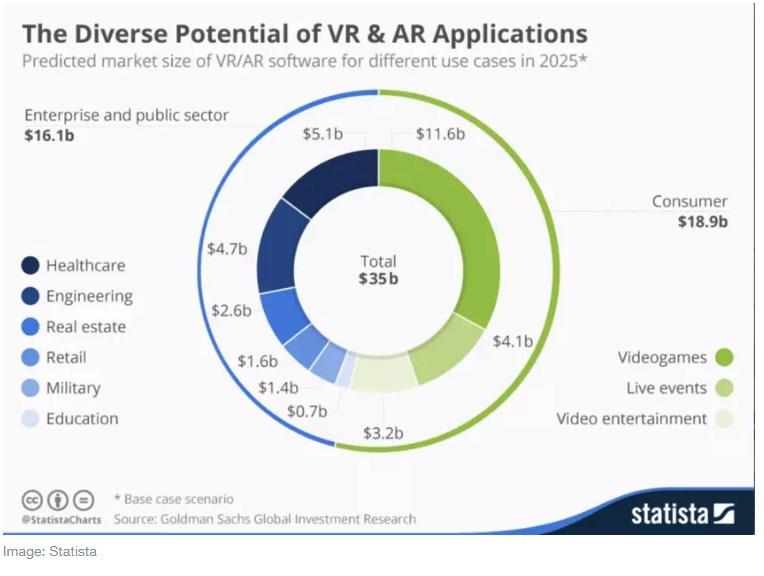by Karen Silverman and Thomas A. Campbell*
As we continue to grapple with governance imperatives for artificial intelligence (AI), the emergence and acceleration of augmented and virtual reality (AR/VR, also known as XR) presents a related and important governance frontier – raising novel and complex challenges for which we, and our legal system, are ill-prepared.
Historically, we have let societal, judicial and legislative forces produce rules for new technologies. We are slow to innovate legal frameworks for new technologies that require new ways of thinking. XR is outpacing this watch-and-wait approach, however, precisely because of its whole-world and dimension-shifting capabilities.
XR technology is immersive, increasingly realistic, and evolving fast:
-A recent review by CNET demonstrates how far the field has progressed; for example, all VR systems on the market today offer not only visual digital immersion, but also haptic sensors that enable one to detect and grab objects within virtual environments.
-Market researchers forecast AR growth from $15.3 billion in 2020 to $77 billion by 2025, and VR growth from $6.1 billion in 2020 to $20.9 billion by 2025.
-In 2021, nearly 60 million Americans will use VR, and 93.3 million will use AR at least once a month.
-According to the Washington Post, ’Global spending on AR and VR is expected to jump more than sixfold to $72.8 billion in 2024 from about $12 billion in 2020 as more companies adopt the technology following the pandemic, according to market research firm IDC’.
-Almost a fifth of Facebook employees now work on XR; Facebook’s CTO recently stated that most of Facebook’s users ( around 2.7 billion people) will be in VR within only a few years. Facebook recently announced its release of Horizon Workrooms, a VR service that enables users to customize avatars and host interactive meetings in virtual conference rooms.
As more users interact in and with XR environments, commercial rules are being formed through supply contracts, terms of use, and risk and rights allocations – well before we fully understand how XR will impact individuals and organizations, the types of disputes they produce, or the challenges they present to social and judicial systems.
The US relies heavily on litigation to establish functional boundaries on behaviours, resolve disputes and interpret laws. This means that new enforceable standards (a) take a long time to develop; (b) tend to trail the emergence of societal norms and expectations; and (c) tend to focus on edge cases that (d) are decided by judges and juries with differing levels of expertise in this technology. It’s also worth noting that in the US alone, more than 85,000 local government districts enforce laws governing everyday and extraordinary conduct – with many differences one to the next.
Relatedly, the public frequently expects more expansive protections from this iterative legal system than it gets. This gulf – between what the public expects and what the law actually does – shows up in frustrated calls for overly expansive use of the antitrust laws, or for the assertion of broad privacy rights, more strenuous efforts to curb stalking, public corruption, and untrue, hateful and harassing speech (often directly threatening women) online. The law is cautious in regulating offensive conduct short of direct physical or financial harm (and enforcement is notoriously uneven). If our experience with the internet is any guide, relying on litigation – or norms and manners – to govern our XR experiences will prove to be disappointing and ineffective.

As we think about what will govern XR experiences, we must recognize that all behaviours, assets and disputes encountered in real life will also occur in XR, along with dazzling new dimensions of conduct and capabilities (flying! transforming! invisibility!). This provokes many questions beyond those we are already struggling with in online settings. A few to consider:
-If AR is by definition designed to interact with and augment the natural world, will existing rules better correlate there than in more self-contained VR environments?
-When and how do laws and regulations (such as indecent exposure, fraud or assault) apply to XR conduct that is first governed by contract on a private platform? Is it reasonable to expect users to enforce their contract rights, or look to the platform provider to police activity?
-Are there public interest limits to what rights can be contracted away? Are consents adequate? What does that mean in the context of a virtual environment where users may seek out unusual or novel experiences?
-Which categories of user or platform conduct are appropriate for state law enforcement (civil or criminal)? How and when will real-world law enforcement reach conduct that occurs entirely in a virtual world? How will we ensure social justice and even-handed enforcement?
-Do the same rules apply when the XR conduct has direct, real-world effects (like causing a car crash or embezzling money, for example) or less physical effects (such as causing real emotional distress, attention disorder or a riot)?
-Where does the conduct take place, for jurisdictional purposes?
-What is the evidentiary value of one’s statements and conduct in VR? What is the admissibility to establish patterns, intent or character?
-What are reasonable or effective remedies for actionable conduct in XR?
-How will we handle joint liability? Intellectual property? Wealth and tax? Insurance? Defamation? Unauthorized uses or modifications of one’s likeness? One’s voice? When is tech ‘enhancement’ fair use, or too much?
-Should any essential rules apply in virtual environments – for instance, to protect human rights, or vulnerable groups – and how will they be developed or enforced, and by whom?
-What are the protections and limits on derivative uses of the truly vast quantity of personal data that will be generated every second of every day – data that will be very intimate and specific, and easily used as a personal identifier?
These and many other novel questions will challenge society and our legal system as we encounter behaviours and outcomes in XR for which the courts – alone, or at all – do not offer adequate process or redress. Legal scholars are beginning to unpack these issues, but there is a very long way to go. As one character observes in the sci-fi novel Ready Player Two: “And sometimes when you think you’ve reached the end of the game, suddenly you find yourself standing at the start of a whole new level. A level you’ve never seen before.”
*Founder& Chief Executive Officer, The Cantellus Group and Founder and CEO, FutureGrasp
**first published in: www.weforum.org




 By: N. Peter Kramer
By: N. Peter Kramer
